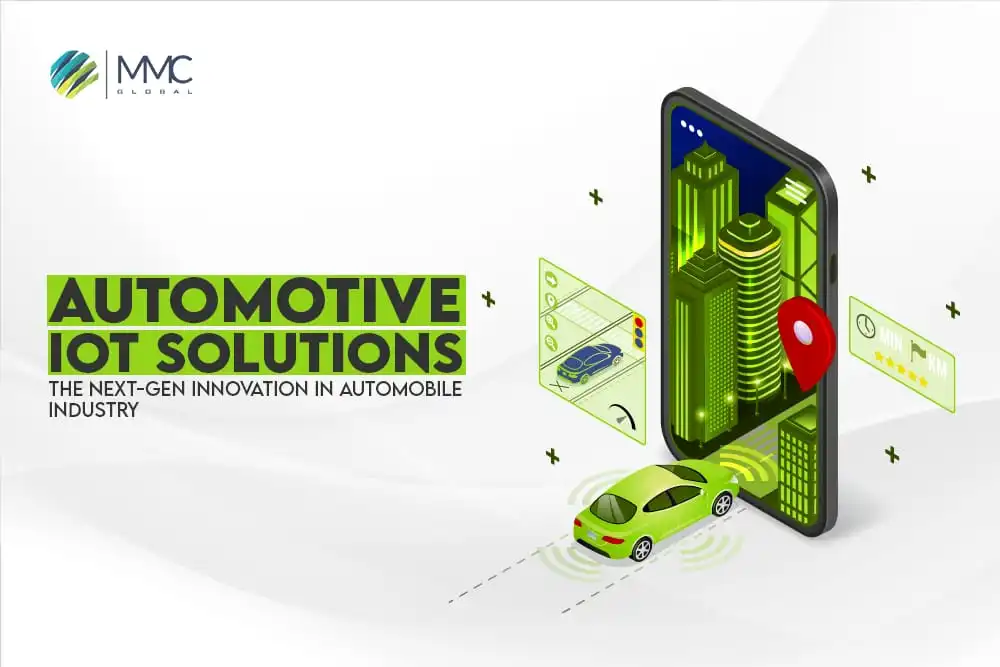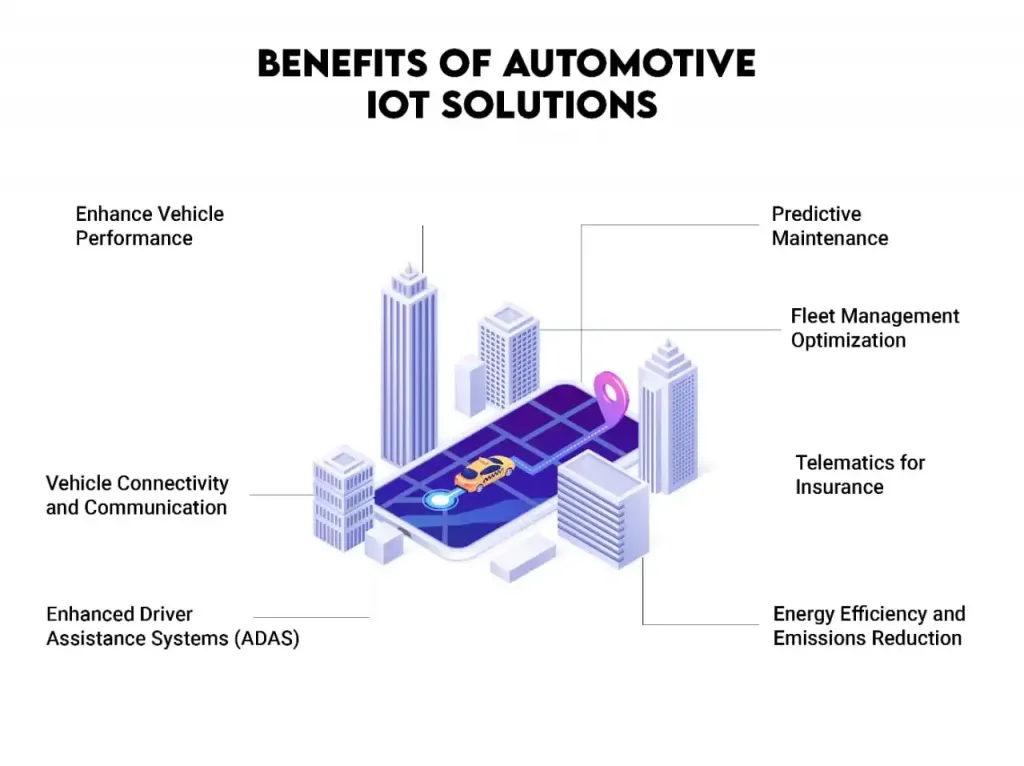Automotive IoT Solutions: The Next-Gen Innovation In Automobile Industry


The ever-evolving automobile IoT solutions are increasing like a fire. Every technology enhancement transforms the traditional process into a contemporary approach. IoT technology revolutionizes multiple industries, including eCommerce, healthcare, education, automobiles, etc. In this article, we will discuss integrating automotive IoT solutions in the automobile industry that make autos more innovative, convenient, and efficient.
However, the IoT market has grown and gained traction in the automobile industry. The IoT industry is expected to top $1 trillion by 2024, according to Exploding Topics. Moreover, Cisco research claims that 500 billion devices will be connected to the internet by 2030. Tech Jury also commits that 127 new IoT devices connect to the internet every second.
What is IoT Solutions?
Internet of Things or IoT technology has a major role in connecting tech devices to communicate and perform desired actions. It helps devices to be smart enough to associate with other devices to share as well as distribute data. Moreover, this data can be shared from device to device and device to cloud.
The integration of IoT can be possible in sensors and software with the help of professional IoT specialists. IoT is a complex technology that requires expertise to develop and understand the gravity of the situation to connect devices.
IoT Technology In the Automotive Industry
The embedment of IoT in automotive reinforces the efficiency and connectivity in vehicles. The main feature of automotive IoT is to connect vehicles to a system to distribute and exchange data between devices and the cloud. In fact, controlling vehicles, predictive maintenance, ensuring vehicle security, and optimizing vehicle performance are the best functions of automotive IoT solutions.
In fact, at MMC Global, you can find expert IoT consultants who help you assist in the utmost utilization of IoT technology. We have digitally transformed businesses of different industries by integrating futuristic technology, including AI and ML, IoT, cybersecurity, blockchain, etc.
If you want to belong industry that you think IoT can be a good fit for your business, get in touch with us for a better approach and trusted IoT development service.
However, the rising demand for automobile IoT solutions allows the industry to make feature-rich automobile functionalities to track and monitor vehicle performance. Everything is transformed with automotive IoT solutions, from data collection, analysis, and communication to maintenance predictivity.
Regarding the fact that IoT is a next-gen technology due to its highly adaptive and scalable functionalities, the automobile industry is ready to invest in it in the coming years. The concept of connected cars emerges like a boom. The aww-stuck features, including smart navigation, safety, efficiency, and auto-monitoring, are worth mentioning here.
Let’s see how beneficial IoT is for automobile and vehicle manufacturing industries.
Benefits of Automotive IoT Solutions
IoT-enabled automotive optimized the transportation and logistic operations for companies whose major operational area is associated with logistics and supply. Moreover, an ordinary person who possesses a smart car also provides the best driving experience.
Let’s see how!

Enhance Vehicle Performance
Enabling IoT in automotive improves the performance of vehicles by identifying vehicle health, monitoring issues, and real-time diagnosis of glitches. This also enhances the power of the vehicle driving experience and optimizes functionalities. The on-time anomaly detection can save the driver from a huge cost and inconvenience. Moreover, interconnected cars with IoT solutions can optimize route planning, maintenance scheduling, and transportation monitoring.
Vehicle Connectivity and Communication
One of the primary advantages of IoT solutions in automobiles is the establishment of seamless connectivity. Through embedded sensors and communication modules, vehicles can exchange data with each other, infrastructure, and central control systems. Moreover, vehicle connectivity enables real-time communication for traffic updates and road conditions and even facilitates vehicle-to-vehicle (V2V) and vehicle-to-infrastructure (V2I) communication. This enhanced connectivity is instrumental in preventing accidents, optimizing traffic flow, and improving overall road safety.
Predictive Maintenance
IoT technology enables vehicles to monitor their own health and performance through a network of sensors. These sensors collect data on various components such as engine health, tire pressure, and brake condition. By analyzing this data in real-time, automobile manufacturers and service providers can predict when a component is likely to fail and schedule maintenance before a breakdown occurs. This proactive approach to maintenance not only reduces unexpected vehicle downtime but also extends the lifespan of vehicle components, leading to cost savings for both consumers and businesses.
Enhanced Driver Assistance Systems (ADAS)
IoT solutions contribute significantly to the development of Advanced Driver Assistance Systems (ADAS). Sensors and cameras integrated into vehicles can monitor the surrounding environment and provide real-time feedback to drivers. Features such as adaptive cruise control, lane departure warning, automatic emergency braking, and parking assistance are made possible through IoT technologies. These systems enhance driver safety, reduce the risk of accidents, and pave the way for the eventual realization of autonomous vehicles.
Fleet Management Optimization
For businesses managing a fleet of vehicles, IoT solutions offer invaluable tools for optimization. GPS tracking, fuel monitoring, and vehicle health diagnostics enable fleet managers to make informed decisions about route planning, fuel efficiency, and maintenance scheduling. This results in reduced operational costs, improved efficiency, and better resource allocation.
Telematics for Insurance
IoT in automobiles plays a crucial role in the evolution of insurance models, particularly with the introduction of Usage-Based Insurance (UBI). Telematics devices, which are often IoT-enabled, collect data on driving behavior, including speed, distance traveled, and braking patterns. Moreover, insurers can leverage this data to tailor insurance premiums based on individual driving habits. It encourages safer driving practices and providing more accurate risk assessments.
Read More: IoT Embedded Systems – Examples & Use Cases in Different Industries
Energy Efficiency and Emissions Reduction
With IoT solutions, vehicles can optimize their energy usage and contribute to environmental sustainability. Smart systems can monitor and control engine performance, reduce fuel consumption, and minimize emissions. Additionally, IoT-enabled electric vehicles can leverage connectivity for efficient charging, grid integration, and energy management, further promoting the adoption of eco-friendly transportation solutions.
[Nasir-hu-mein heading=”Manufacture Smart Automobile With IoT Solutions” para=”We help you make your transportation and logistics smart, informed, and secure. Get professional consultancy and instant action with professional IoT developers.”]We help you make your transportation and logistics smart, informed, and secure. Get professional consultancy and instant action with professional IoT developers.
Ending Notes
The Internet of Things (IoT) has significantly transformed various industries, and the automotive sector is no exception. IoT solutions in automobiles offer a myriad of benefits that enhance safety, efficiency, and overall driving experience.
IoT solutions in automobiles are revolutionizing the industry by enhancing safety, optimizing operations, and providing new levels of connectivity. As technology continues to advance, the integration of IoT in vehicles will likely lead to even more sophisticated features and improvements in the overall driving experience.



